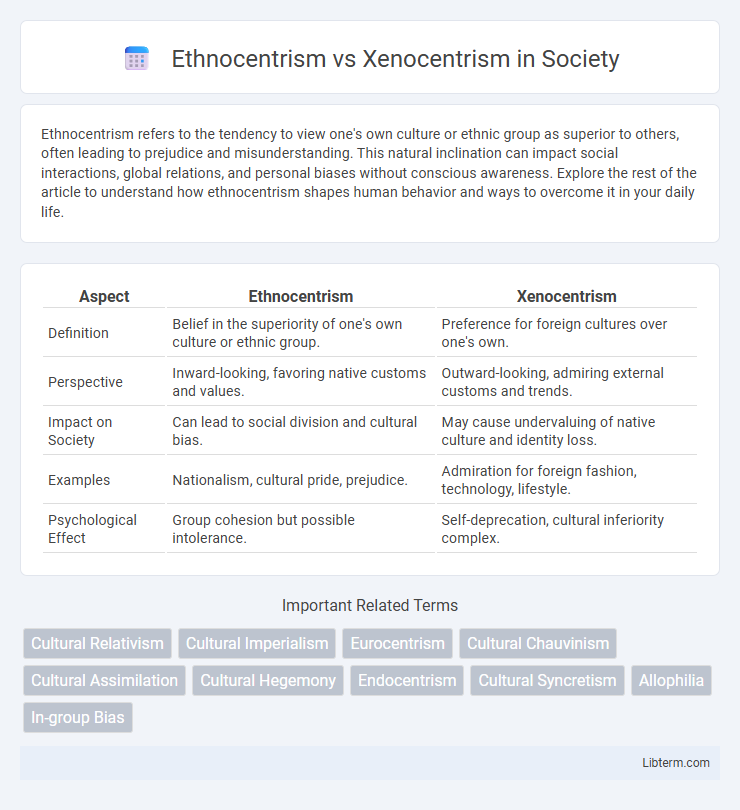Ethnocentrism refers to the tendency to view one's own culture or ethnic group as superior to others, often leading to prejudice and misunderstanding. This natural inclination can impact social interactions, global relations, and personal biases without conscious awareness. Explore the rest of the article to understand how ethnocentrism shapes human behavior and ways to overcome it in your daily life.
Table of Comparison
| Aspect | Ethnocentrism | Xenocentrism |
|---|---|---|
| Definition | Belief in the superiority of one's own culture or ethnic group. | Preference for foreign cultures over one's own. |
| Perspective | Inward-looking, favoring native customs and values. | Outward-looking, admiring external customs and trends. |
| Impact on Society | Can lead to social division and cultural bias. | May cause undervaluing of native culture and identity loss. |
| Examples | Nationalism, cultural pride, prejudice. | Admiration for foreign fashion, technology, lifestyle. |
| Psychological Effect | Group cohesion but possible intolerance. | Self-deprecation, cultural inferiority complex. |
Understanding Ethnocentrism: Definition and Origins
Ethnocentrism is the belief in the inherent superiority of one's own ethnic group or culture, often leading to biased evaluations of other cultures based on one's cultural norms. Originating from psychological and sociological studies, ethnocentrism is deeply rooted in social identity theory, where individuals derive a sense of belonging and self-esteem from their cultural group. Understanding ethnocentrism involves analyzing its impact on intergroup relations, social cohesion, and the perpetuation of stereotypes and cultural misunderstandings.
Defining Xenocentrism: Meaning and Historical Context
Xenocentrism refers to the preference for products, ideas, or cultures perceived as foreign over one's own, often rooted in a belief that external cultures possess superior qualities. Historically, xenocentrism emerged during periods of intensified globalization and colonial encounters, where exposure to diverse cultures influenced social and consumer behaviors by elevating the status of foreign goods and lifestyles. This concept contrasts with ethnocentrism, highlighting different psychological and cultural responses to cultural identity and external influences.
Key Differences Between Ethnocentrism and Xenocentrism
Ethnocentrism involves evaluating other cultures based on the standards and values of one's own culture, often leading to a belief in cultural superiority. Xenocentrism, conversely, is characterized by a preference for or admiration of foreign cultures over one's own, sometimes resulting in the devaluation of native customs. The key difference lies in ethnocentrism's inward cultural bias versus xenocentrism's outward cultural idealization.
Psychological Roots of Cultural Bias
Ethnocentrism arises from an innate psychological need for group identity and social cohesion, leading individuals to view their own culture as superior and judge others accordingly. Xenocentrism, by contrast, stems from feelings of cultural inadequacy or alienation, prompting admiration or preference for foreign cultures over one's own. Both biases reflect deep-seated cognitive processes related to self-esteem, in-group favoritism, and the human tendency to categorize and simplify complex social environments.
Manifestations of Ethnocentrism in Society
Ethnocentrism manifests in society through cultural arrogance and bias, where individuals judge other cultures by the standards of their own, often leading to prejudice and discrimination. This behavior is evident in social segregation, exclusion of minority groups, and resistance to foreign customs or ideas. Such manifestations reinforce social divisions and hinder intercultural understanding and cooperation.
Real-World Examples of Xenocentrism
Xenocentrism manifests in countries like India, where Western culture and products are often preferred over indigenous ones, reflecting a belief that foreign goods are superior. In Japan, some consumers favor European luxury brands, demonstrating a preference for external cultural symbols that signify status and quality. This phenomenon underscores how xenocentrism can influence consumer behavior and national identity by elevating foreign traits above local traditions.
Social Impacts: Pros and Cons of Ethnocentrism
Ethnocentrism fosters social cohesion and a strong sense of identity within groups, promoting cultural preservation and unity. However, it can also lead to social exclusion, prejudice, and intergroup conflict by devaluing or misunderstanding other cultures. The social impacts of ethnocentrism include both enhanced in-group solidarity and increased risks of discrimination and ethnocultural division.
Social Consequences of Xenocentrism
Xenocentrism often leads to social fragmentation as individuals undervalue their own culture in favor of foreign customs, creating identity conflicts and social alienation. This preference for external cultural elements can diminish national pride and weaken social cohesion, fostering a sense of inferiority among community members. The resulting cultural dissonance may increase social tensions and hinder collective efforts toward societal development and unity.
Counteracting Cultural Bias: Promoting Cultural Relativism
Counteracting cultural bias involves promoting cultural relativism, which encourages understanding and evaluating cultural practices within their own context rather than through ethnocentric or xenocentric lenses. Ethnocentrism, the belief in the superiority of one's own culture, and xenocentrism, the preference for foreign cultures over one's own, both distort cultural perception and hinder intercultural harmony. Emphasizing cultural relativism fosters respect for diverse cultural norms and values, reducing prejudice and supporting more nuanced global interactions.
Ethnocentrism vs Xenocentrism: Shaping Global Perspectives
Ethnocentrism and xenocentrism are opposing cultural perspectives that significantly shape global interactions, where ethnocentrism involves evaluating other cultures based on the standards of one's own, often leading to cultural bias and limited understanding. Xenocentrism, by contrast, idealizes foreign cultures over one's own, potentially undermining local identities and fostering dependency on external influences. These contrasting attitudes influence international relations, marketing strategies, and social integration, highlighting the complex dynamics in a globalized world.
Ethnocentrism Infographic

 libterm.com
libterm.com